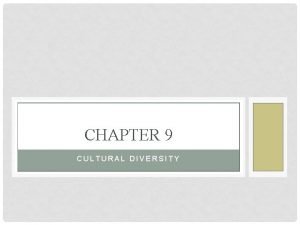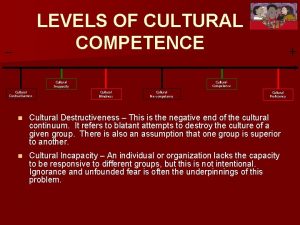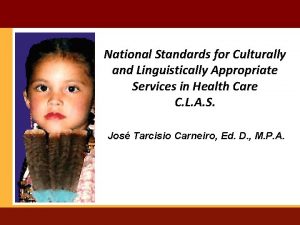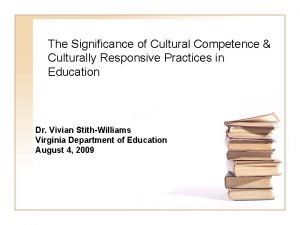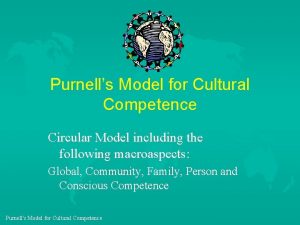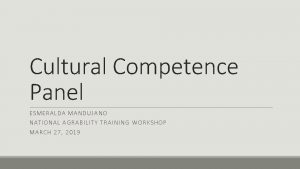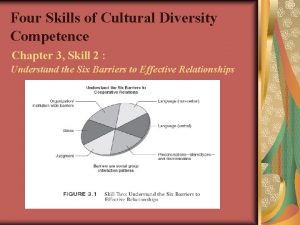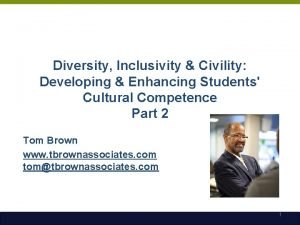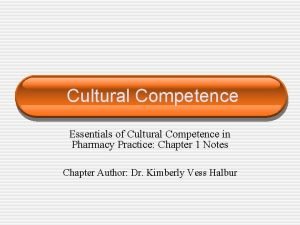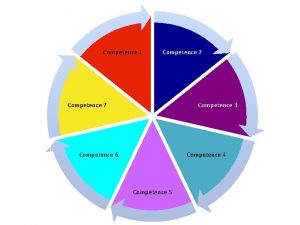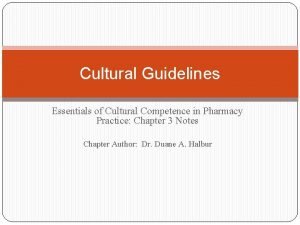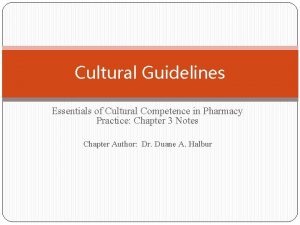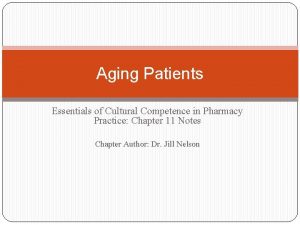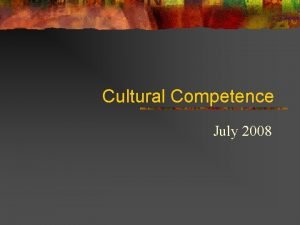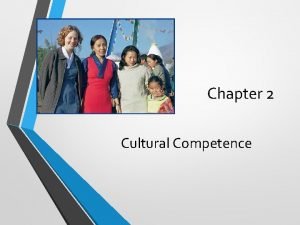Cultural SelfAssessment Essentials of Cultural Competence in Pharmacy












- Slides: 12

Cultural Self-Assessment Essentials of Cultural Competence in Pharmacy Practice: Chapter 2 Notes Chapter Authors: Dr. Kimberly Vess Halbur and Dr. Duane A. Halbur

Learning Objectives 1. List and explain the attitudes, knowledge and skills 2. 3. 4. 5. necessary for cultural competence. Identify at least 5 steps that can enhance one’s cultural competence Examine personal cultural background, beliefs and biases that impact one’s work as a pharmacist Identify existing instruments that assess cultural competence Summarize personal results on the Multicultural Awareness Inventory

Definition of Cultural Competence …encompasses one’s knowledge, attitudes and skills. An ongoing process that grows and develops throughout the duration of one’s career and lifetime.

CC in Pharmacy Practice Accreditation Council for Pharmacy Education: pharmacists must be able to design, implement, monitor, evaluate, and adjust pharmacy care plans that are patient-specific; addressing health literacy, cultural diversity, and behavioral psychosocial issues. Biologic factors such as genetic variations in gene structure, drug metabolism enzymes, receptor proteins also play a role in the efficacy and toxicity of a drug in patients with different racial and ethnic backgrounds. Phamacogenetic and pharmacogenomic research (research in the variation of drug response resulting from inherited differences in drug metabolism or drug targets based upon individual genes or all genes) Pharmacogentics & pharmacogenomics have revealed genetic differences among populations that may affect a drug’s pharmacokinetic and pharmacodynamic properties.

Attitudes Positive attitudes are needed toward your own culture as well as the cultural heritage of your patients. This begins by being able to appreciate, value and respect differences between your own heritage and that of your patients in areas such as race, ethnicity, socioeconomic status, religion, sexual orientation and cultural and health beliefs.

Knowledge Culturally competent pharmacists deliberately seek out various worldviews and explanatory models of disease, knowing that knowledge can help promote understanding between cultures. Pharmacists need to seek knowledge about other cultures and use that knowledge to inform their skills and practice.

Skills Culturally competent pharmacists possess insight, patient assessment, and communication skills necessary to work with diverse populations. Work toward continuous improvement in communication skills every day by seeking consultation with translators, cultural brokers, spiritual leaders and traditional healers.

Initial Steps Toward Cultural Competence 1. Examine your cultural background. 2. Assess your level of cultural competence. 3. Immerse yourself in a community that you would like to learn more about. 4. Work with culturally/ethnically organized student groups, patient groups, or community groups. 5. Read about culture-specific disease states and evidence-based interventions and practice. 6. Host a brown-bag lunch focused on cultural competency. 7. Reach out to religious leaders and organizations. 8. Seek out traditional cultural healers. 9. Talk with patients from diverse backgrounds in your community. 10. Continue to learn.

Role of Cultural Competence in Pharmacy Practice Oppression Racism 1. The belief that race accounts for differences in human character or ability and that a particular race is superior to others. 2. Discrimination or prejudice based on race. Race 1. A local geographic or global human population distinguished as a more or less distinct group by genetically transmitted physical characteristics. 2. A group of people united or classified together on the basis of common history, nationality, or geographic distribution: the German race. 3. A genealogical line; a lineage. 4. Humans considered as a group. Ethnicity

More terms… Cultural Blindness—differences are ignored. Treat all people the same thereby only meeting the needs of the dominant group. Privilege— 1 a. special advantage, immunity, permission, right, or benefit granted to or enjoyed by an individual, class, or caste. b. Such an advantage, immunity, or right held as a prerogative of status or rank, and exercised to the exclusion or detriment of others. 2. The principle of granting and maintaining a special right or immunity: a society based on privilege. Cultural Privilege A Caucasian professor’s view: http: //www. ndsu. edu/ndsu/news/magazine/vol 06_issue 02/pri vileged. shtml

Cultural Competence Elusive No end point Requires openness of mind Galanti (2004) points out the difference between a generalization and a stereotype is that a generalization is a starting point whereas a stereotype is an end point.

Reflection Questions 1. Your cultural background will impact your practice as a pharmacist. What positive implications could your background contribute to your role as a pharmacist? What negative implications might exist? 2. In which areas of cultural competence do you feel most confident? In which areas do you feel least confident? 3. What did you learn when you read the cases of Brian and Sunita? What ideas did you have about Jewish people or Native Americans before reading the cases? After? 4. What diverse groups exist in your community that you could learn more about? What steps have you taken to become more competent in these areas? 5. Name the group(s) of people against whom you were taught biases. What have you done to rectify those beliefs? What can you still do? 6. What steps will you take to ensure an ongoing commitment to being a culturally competent pharmacist?
 Chapter 9 cultural competence
Chapter 9 cultural competence Threatens red
Threatens red What is cultural incapacity
What is cultural incapacity Naeyc pathways to cultural competence checklist
Naeyc pathways to cultural competence checklist Cultural competence on resume
Cultural competence on resume National centre for cultural competence
National centre for cultural competence Nea cultural competence
Nea cultural competence Cultural competency staircase
Cultural competency staircase Cultural competence
Cultural competence Purnell's model for cultural competence
Purnell's model for cultural competence Cultural competence
Cultural competence Four skills of cultural diversity competence
Four skills of cultural diversity competence Understanding civility and cultural competence
Understanding civility and cultural competence
